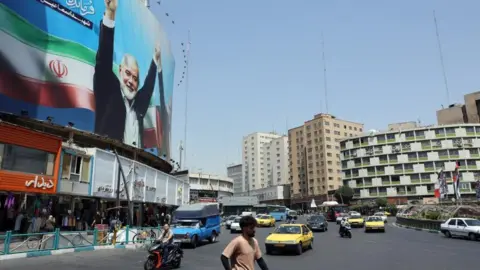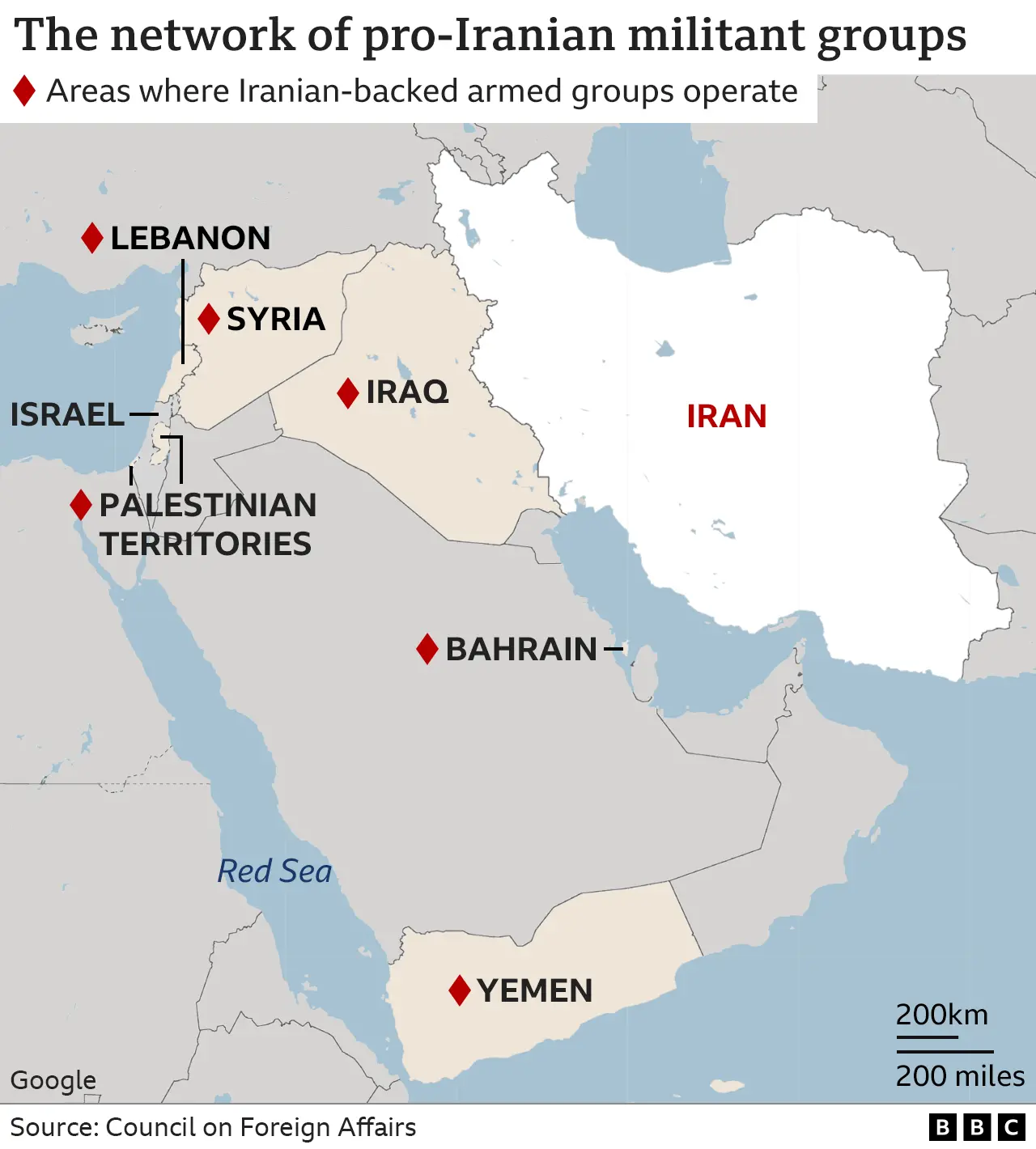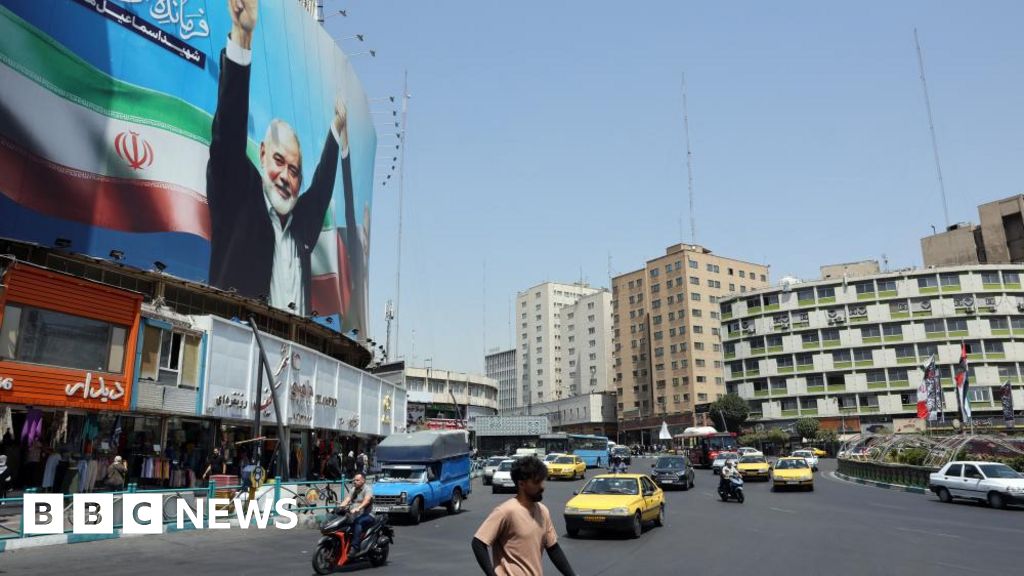 EPA
EPAIsrael carried out a series of night airstrikes against Iran, hitting what Israel called “military targets.”
The attack had been expected for weeks in retaliation for Iran’s missile attack on Israel.
Why did Israel attack Iran now?
Israel had vowed to strike back after Iran launched a ballistic missile attack on Israel on October 1. In this attack, Iran fired more than 180 missiles at Israel. Most were intercepted by Israeli air defenses and US-led coalition forces. However, some attacked air bases and other locations. One Palestinian was killed by a falling missile casing.
Israel said it would retaliate, but did not say when or how. Since then, there has been constant speculation about the timing of an Israeli attack and what form it might take, ranging from a limited attack to a major attack on Iran’s oil fields and nuclear facilities.
The attack took place early Saturday morning and appeared to be limited to missile production and launch facilities and what Israel called “other aviation capabilities,” although no specifics were given.

Why did Iran attack Israel before and how did Israel respond?
Iran announced an attack on Israel on October 1 in retaliation for the killing of leaders and senior Iranian commanders of the Iranian-backed militant groups Hezbollah and Hamas fighting against Israel.
Hezbollah leader Hassan Nasrallah and Brigadier General Abbas Nilforoushan were killed on September 27 in the Lebanese capital Beirut when Israel bombed the building they were in. Hamas political leader Ismail Haniyeh was killed on July 31 in an explosion at the compound where he was staying during a visit to Tehran. Iran blamed Israel for the attack, but Israel has neither admitted nor denied involvement.
This is Iran’s second direct attack on Israel in history. This came five months after the US first attacked Israel with a wave of about 300 drones and missiles. Israel said almost all were intercepted. The attack was in retaliation for an Israeli airstrike on the Iranian consulate in the Syrian capital Damascus on April 1, which killed 13 people, including seven members of the Iranian Overseas Quds Force. Two of the dead were a senior Quds Force commander and his deputy. Iran said the attack was a violation of its sovereignty.
The Quds Force is part of Iran’s most powerful military, the Islamic Revolutionary Guards Corps (IRGC).
The Revolutionary Guards are sending weapons and equipment, including high-precision missiles, to Hezbollah through Syria.
Almost three weeks later, Israel retaliated against Iranian missile and drone strikes, hitting targets in central Iran’s Isfahan region. U.S. officials confirmed the Israeli attack, but Israel did not comment. An Israeli drone has reportedly hit the radar of Iran’s Russian-made S-300 air defense missile system, which Israel believes poses a particularly dangerous threat to its fighters in nearby airspace.
The radar attack was limited and believed to be aimed at demonstrating Israel’s ability to attack Iranian military facilities.

Why are Israel and Iran enemies?
Until Iran attacked Israel directly on April 1, Iran and Israel had been engaged in a years-long shadow war in which they attacked each other’s assets without admitting responsibility.
These attacks intensified considerably during the Gaza war, which began last October with attacks by the Palestinian group Hamas on neighboring Israeli communities.
The two countries were allies until the 1979 Iranian Islamic Revolution, which created a regime that used its enemy Israel as a key part of its ideology.
Iran does not recognize Israel’s right to exist and seeks its eradication. The country’s supreme leader Ayatollah Khamenei described Israel as a “cancerous tumor” that “will definitely be uprooted and destroyed.”
Israel is a terrorist attack on Israel, as evidenced by Tehran’s rhetoric, the expansion of its proxies in the region, including the Lebanese Shiite militant group Hezbollah, which has vowed to destroy Israel, and the financing and arms supply of Palestinian groups, including Hamas. , believes that Iran poses an existential threat.
It also denies that Iran is seeking to build a nuclear bomb, but accuses Iran of secretly attempting to develop nuclear weapons.

Do Iran and Israel have nuclear weapons? What are the military capabilities of Israel and Iran?
Although Iran is geographically much larger than Israel, with a population of about 90 million people, almost 10 times Israel’s, this does not translate into increased military power.
Iran has invested heavily in missiles and drones. The country has a vast arsenal of its own and supplies large sums of material to its proxies, Yemen’s Houthis and Lebanon’s Hezbollah.
Significantly upgraded air defense systems and fighter aircraft. Russia is believed to be working with Iran to make improvements in exchange for the military support Iran has given Russia in its war with Iran. It provided Iran with Su-35 fighter jets and advanced S-300 air defense missile systems.
However, Israel has one of the most advanced air forces in the world. According to the International Institute for Strategic Studies (IISS) Military Balance Report, Israel has at least 14 squadrons, including F-15s, F-16s, and the latest stealth aircraft, the F-35.
Israel has experience in conducting attacks deep into hostile territory. The shortest distance between Iran and Israel is approximately 1,000 km (620 miles). The distance from Tel Aviv to Tehran is approximately 1,600 km, further than the Israeli fleet can operate without refueling.
Israel is believed to have nuclear weapons, but maintains vague official policy. Although Iran does not possess nuclear weapons, Western countries suspect that Iran is secretly seeking to develop one. Iran vehemently denies that it is trying or desiring to acquire nuclear weapons.
Like Israel, Iran has a civilian nuclear program, but it has been secretly running a parallel program for decades to produce enriched uranium, the raw material for nuclear bombs, and the missiles to deliver it. There are suspicions.
The head of the world nuclear watchdog said in May that it would take Iran “weeks, not months” to obtain enough material for a nuclear bomb. However, this does not mean that Iran will be attacked within weeks of the bomb. The final step is still needed to enrich the material to military-grade levels and possess a warhead, but it is not believed to have it.
Israel is not a party to the Treaty on the Non-Proliferation of Nuclear Weapons (NPT), but Iran is. The NPT aims to stop the proliferation of nuclear weapons and requires member states to open their nuclear facilities to inspections to ensure they are used for purely peaceful purposes.
A 2015 U.N.-backed deal with Iran agreed to limit its nuclear activities in exchange for the lifting of economic sanctions, but it all but collapsed in 2018 when then-President Trump withdrew the United States. Since then, Iran has stepped up its nuclear program.

Who are Iran’s allies?
Iran has built a network of allies and proxies in the Middle East and claims to form part of an “axis of resistance” challenging U.S. and Israeli interests in the region. Support them to varying degrees.
Syria is Iran’s most important ally. Iran, along with Russia, helped Syria’s Bashar al-Assad regime survive a decade-long civil war.
Relations between Iran and Russia are also becoming increasingly important. Russia’s Foreign Ministry announced in December that the two countries would accelerate work on developing a “major new interstate agreement.”
Iran provided Russia with Shahid attack drones. In February, Reuters reported, citing sources, that Iran had also provided ballistic missiles. Iran denied the report. Meanwhile, Iran said Russia plans to provide Iran with more advanced aircraft.

The most powerful Iranian-backed militant group is Lebanon’s Hezbollah. Since the war broke out between Israel and Hamas, there have been cross-border firefights with Israel almost every day. Tens of thousands of civilians have been forced from their homes on both sides of the border.
Iran supports Iraqi Shiite militias that have attacked U.S. military bases in Iraq, Syria and Jordan with rockets. The United States retaliated after three soldiers were killed at a military outpost in Jordan.
In Yemen, Iran supports the Houthi movement, which controls the country’s most populous region. The Houthis have fired missiles and drones at Israel and have also attacked commercial ships near the Yemeni coast, sinking at least one vessel. The US and UK responded by attacking Houthi targets.
Iran also provides weapons and training to Palestinian militant groups, including Hamas, which attacked Israel on October 7 last year. However, Iran denies any involvement in the October 7 attack itself.
Additional reporting by Tom Spender and Defense Correspondent Jonathan Beale




